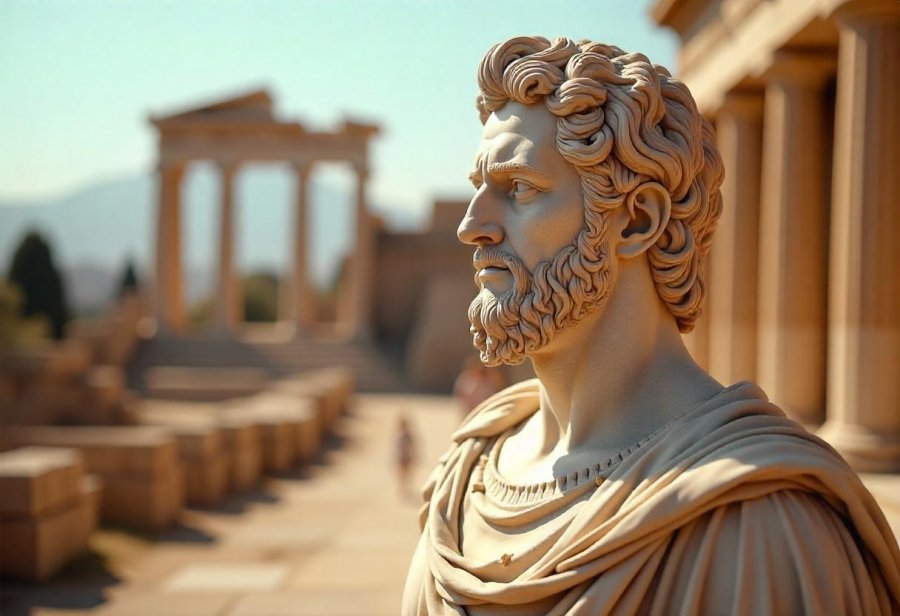
Uncover the extraordinary strategies and relentless ambition that transformed Alexander the Great from a young prince into one of history’s most iconic conquerors. His leadership was rooted in innovative tactics, cultural sensitivity, and psychological mastery, enabling him to forge an empire that blended diverse civilizations. But what truly set him apart was his ability to think dynamically—adapting tactics swiftly, inspiring unwavering loyalty, and leveraging terrain and psychological warfare to his advantage. His legacy offers timeless lessons: in today’s rapidly changing world, adaptability, cultural intelligence, and purpose-driven leadership remain vital. Could his methods inspire modern leaders to navigate complexity, foster resilience, and ignite transformation? His story challenges us to reconsider how vision, discipline, and empathy can create enduring influence—prompting us to ask: what lessons from Alexander’s playbook can shape the future of leadership?

Unveiling the Legacy of Alexander the Great: A Journey Through Conquest and Inspiration
Alexander the Great stands as one of history’s most compelling figures, not solely because of the vast territories he conquered but due to the enduring legacy of leadership, innovation, and ambition that he exemplifies. His story is a testament to how a young prince, armed with vision and strategic brilliance, managed to reshape the ancient world and leave a mark that continues to influence modern thought. To fully appreciate the scope of his impact, we must first consider the complex geopolitical and cultural landscape into which he was born—a world rife with division, rivalry, and the potential for transformative change.
Born in 356 BCE in Pella, the Macedonian capital, Alexander inherited a kingdom that was both militarily formidable and politically fragile. His father, Philip II, had already laid the groundwork for Macedonian dominance through military reforms, strategic alliances, and the creation of a professional, disciplined army. These innovations provided Alexander with a robust foundation from which his own campaigns would spring. Beneath the surface of Macedonian strength, however, lay a fractured Greek world, with city-states often embroiled in petty rivalries despite their shared language and religious traditions. This mosaic of fragmented polities presented both a challenge and an opportunity—one that Alexander recognized early on as he sought to forge unity through conquest and cultural influence.
Across the Aegean and beyond, the Persian Empire loomed as the dominant power—vast in territory, wealth, and complexity. Its sophisticated administrative system and extensive network of satrapies contrasted sharply with the more fragmented Greek city-states, which often relied on alliances and ephemeral military pacts. Persia was a diverse tapestry of peoples and traditions, making it a formidable adversary but also a fertile ground for cultural exchange. Internal tensions within Persia, combined with its sprawling expanse, offered both obstacles and incentives for Alexander’s expansionist ambitions. His confrontation with Persia became more than a military campaign; it was a strategic effort to bridge East and West, forging a new world order rooted in the integration of diverse civilizations.
Stepping into this environment of rivalries and ambitions, Alexander’s approach to conquest was shaped by a keen awareness of opportunity and challenge. His vision extended beyond mere territorial expansion; he aimed to reshape the political and cultural fabric of the regions he sought to control. His approach was characterized by a combination of tactical innovation, charismatic leadership, and cultural sensitivity—traits that allowed him to inspire loyalty among a diverse array of troops and allies. His campaigns facilitated a cultural fusion that laid the groundwork for the Hellenistic civilization, blending Greek traditions with Egyptian, Persian, and Central Asian influences. This synthesis not only stabilized his empire but also created a shared cosmopolitan identity that persisted long after his death, influencing art, science, and governance for generations.
Understanding Alexander’s significance requires recognizing that his success was not solely rooted in military prowess but also in his ability to think strategically, adapt swiftly, and inspire others. His legacy exemplifies how visionary leadership can challenge established boundaries, forge new paths, and transform entire societies. As we explore his strategies and their enduring influence, it becomes clear that Alexander’s leadership was a complex interplay of innovation, cultural insight, and relentless ambition—traits that continue to resonate as lessons for leaders across ages and disciplines. His story remains a powerful reminder that the true measure of greatness lies not just in conquest, but in the ability to inspire change that endures beyond one’s lifetime.
Foundations of Victory: The Strategic Bedrock of Alexander’s Conquests
Alexander’s remarkable conquests were not the result of luck or impulsive bravado; they were rooted in a meticulously crafted foundation of strategic innovation, disciplined training, and charismatic leadership. From an early age, he benefitted from an intensive education under Aristotle, whose teachings imbued him with a profound understanding of philosophy, politics, and military tactics. This intellectual grounding fostered a strategic mindset that valued wisdom and practical application, guiding his decisions on the battlefield and in diplomacy. It was this fusion of knowledge and action that set the stage for his extraordinary campaigns, ensuring he approached conquest not merely as a matter of brute force but as a complex interplay of ideas and tactics.
At the heart of Alexander’s military success lay his pioneering use of combined arms tactics that challenged conventional warfare of his era. Unlike armies that relied on static formations and brute numbers, he emphasized mobility, coordination, and adaptability across different troop types. His infantry, armed with long sarissas in the Macedonian phalanx, formed a formidable core, but it was his highly maneuverable cavalry that truly differentiated his approach. These swift horsemen executed complex flanking maneuvers and surprise attacks, often turning the tide of battle in moments. The integration of these forces created a dynamic battlefield presence, allowing Alexander to outthink and outmaneuver opponents who relied on heavier, less flexible tactics.
Logistics and terrain awareness were equally critical in shaping his campaigns. Alexander understood that victory extended beyond tactical brilliance; it depended on meticulous planning—knowing when, where, and how to strike. He mastered the art of supply management across rugged mountains, deserts, and urban centers, often operating in environments that would have daunted less prepared commanders. His logistical discipline ensured his armies could move swiftly and sustain themselves over vast distances, frequently outpacing enemy responses. By leveraging terrain to his advantage—whether crossing a narrow mountain pass or sieging a well-fortified city—he demonstrated an acute understanding that victory was as much about environment as it was about force.
Leadership was the glue that held his formidable military machine together. Alexander’s personal charisma, unwavering confidence, and ability to inspire loyalty fostered an extraordinary bond with his troops. Unlike distant rulers or commanders, he led from the front, sharing hardships and exemplifying personal bravery. This shared experience created a powerful esprit de corps that transcended cultural and linguistic divides within his diverse forces. His disciplined yet empathetic leadership style motivated his soldiers to endure extreme hardships and pursue seemingly impossible goals, forging a unified front capable of undertaking the most ambitious campaigns.
Behind every tactical innovation and daring maneuver was a leader whose mental framework prioritized resilience, flexibility, and cultural intelligence. Alexander’s approach was characterized by real-time assessment and swift adaptation; he treated each campaign as a fluid puzzle, constantly refining tactics to meet evolving circumstances. He understood that morale and loyalty were as vital as weaponry, fostering trust through shared hardship and leading by example. His strategic decisions often involved psychological warfare—using rumors, feigned retreats, and surprise attacks to unsettle enemies and lower their morale. This mental agility, combined with his mastery of terrain and logistics, created a resilient, adaptive force capable of transforming initial setbacks into decisive victories.
In sum, Alexander’s foundations were built on a sophisticated interplay of tactical innovation, logistical mastery, charismatic leadership, and cultural sensitivity. His ability to integrate these elements into a cohesive strategy allowed him to conquer vast territories and forge an empire that blended diverse traditions. These core principles—mobility, adaptability, cultural awareness, and psychological insight—remain relevant today, offering enduring lessons in leadership and strategic thinking. His success was not merely a product of martial prowess but a reflection of his capacity to think broadly, act decisively, and inspire unwavering loyalty—traits that continue to define the most influential figures in history.

Mental Models of a Conqueror: Deep Dive into Leadership and Strategy
At the heart of Alexander’s legendary success lay a set of guiding principles and mental models that shaped every decision, maneuver, and interaction—both on the battlefield and beyond. While his tactical ingenuity often draws admiration, it is his underlying mindset—the way he thought about leadership, risk, and adaptability—that truly illuminates the depth of his mastery. His approach was characterized by an unwavering focus on flexibility; he viewed each engagement as a living puzzle that demanded real-time assessment and swift adjustment. This mental agility enabled him to read the battlefield with remarkable acuity, quickly identifying weaknesses in enemy formations, terrain advantages, and fleeting opportunities that others might overlook. Instead of relying on rigid plans, Alexander treated each campaign as a dynamic process, constantly refining his tactics to meet the evolving circumstances.
Psychological resilience formed another cornerstone of his leadership philosophy. Alexander understood that morale, loyalty, and shared purpose were as vital as military strength. He fostered unwavering trust among his troops by sharing their hardships, leading from the front, and exemplifying personal bravery. His soldiers saw in him not just a distant commander but a leader who endured the same risks and hardships they faced. This shared experience created a bond that transcended language and cultural divides, uniting a diverse force behind a common cause. His ability to inspire confidence and loyalty in such a varied group was fundamental to maintaining cohesion during long, arduous campaigns across unfamiliar territories.
Strategic thinking for Alexander extended beyond tactics to encompass a nuanced understanding of terrain, logistics, and timing. His campaigns demonstrate an exceptional capacity to evaluate the environment and leverage it to his advantage—be it a narrow mountain pass, a river crossing, or a city’s defenses. Victory often depended on how well he understood and manipulated the physical landscape, rather than sheer force alone. His logistical mastery—ensuring swift movement, secure supply lines, and adaptable strategies—enabled his armies to operate with remarkable speed and endurance. By exploiting terrain intricacies and logistical advantages, he could strike unexpectedly and sustain momentum even over vast distances, often catching foes unprepared.
A distinctive aspect of Alexander’s mental framework was his mastery of psychological warfare and surprise tactics. He recognized that the battlefield extended beyond physical forces to the realm of human perception and morale. Rumors, feigned retreats, and daring flanking maneuvers were tools he employed to unsettle enemies and lower their confidence. His willingness to take calculated risks—often risking everything on a bold gamble—stemmed from a deep-rooted confidence, built through meticulous planning and an acute understanding of human psychology. These daring tactics created chaos within enemy ranks, lowering morale and causing disarray, often turning potential disadvantages into decisive victories. His strategic use of psychological pressure turned the tide of battles and demonstrated how influence over minds can be as decisive as controlling terrain.
Fluidity and adaptability defined his mental approach to leadership. Alexander was not wedded to any fixed plan; he continually reassessed the situation and adjusted tactics accordingly. Whether at Gaugamela or during the Siege of Tyre, he demonstrated an instinct for reading circumstances and modifying his approach to exploit emerging opportunities. This constant learning and flexibility set him apart from many contemporaries, allowing him to respond swiftly to setbacks, capitalize on fleeting openings, and maintain the initiative even when conditions shifted dramatically. His ability to adapt on the fly was perhaps his most valuable asset, transforming potential failures into opportunities for victory and ensuring that he remained one step ahead of adversaries who relied on static tactics.
Finally, Alexander’s understanding of cultural dynamics and integration complemented his tactical and strategic brilliance. His efforts to blend Greek traditions with those of Persia and the East were rooted in a belief that lasting influence depended on respect and genuine understanding of local customs. He fostered loyalty and stability by incorporating local elites into his administration, founding cities as cultural hubs, and promoting practices that resonated with diverse peoples. This cultural sensitivity not only stabilized his empire but also facilitated the spread of Hellenistic ideas, art, and science across vast regions. His capacity to think broadly—integrating ideas, traditions, and people—created a resilient, adaptable empire that endured beyond his lifetime, illustrating that true leadership involves more than martial prowess; it requires a sophisticated mental model of cultural integration and influence.
This comprehensive approach to leadership and strategy underscores the importance of developing a mental framework that balances tactical flexibility, psychological resilience, and cultural intelligence. For those interested in deepening their understanding of effective leadership, exploring resources like leadership models can provide valuable insights into building such mental models and applying them in diverse scenarios.
Modern Lessons from a Legendary Leader: Applying Alexander’s Strategies Today
Applying Alexander’s strategies in today’s world reveals a treasure trove of insights that remain remarkably relevant despite the vast differences in environment and technology. Central to his success was an extraordinary capacity for adaptability—an ability to pivot swiftly in response to new information, shifting conditions, or unexpected challenges. Modern leaders and organizations thrive when they cultivate this mental agility, viewing change not as a threat but as an opportunity for growth. Developing a mindset that embraces continuous reassessment and learning transforms uncertainties into catalysts for innovation and resilience. When faced with disruptions—whether technological, geopolitical, or market-driven—those who can adjust their strategies in real time will outpace competitors and navigate complexity with greater confidence.
Leadership inspired by Alexander’s example emphasizes authentic engagement and shared purpose. His personal charisma and example of resilience forged bonds that transcended cultural and linguistic barriers. Today, effective leaders foster loyalty by demonstrating integrity, transparency, and leading through action. Building trust becomes a foundation for collective resilience, enabling teams to face setbacks, adapt to change, and pursue ambitious goals with unity. When leaders prioritize emotional intelligence alongside strategic clarity, they create environments where collaboration and loyalty flourish, even amid turmoil. This approach ensures that organizational culture remains strong, motivated by a sense of shared mission that fuels persistence and innovation.
Risk-taking, when paired with disciplined planning, remains a cornerstone of strategic success. Alexander’s bold maneuvers—such as rapid flanking or daring crossings—highlight that courageous moves rooted in thorough preparation can unlock extraordinary results. Modern organizations should foster a culture that encourages experimentation and values learning from failure. When innovation is supported by rigorous risk analysis and contingency planning, breakthroughs become more attainable. The key is to balance daring initiatives with a clear understanding of potential downsides, enabling leaders to push boundaries confidently while managing inherent uncertainties. This combination of courage and discipline creates a fertile environment for transformative growth rather than stagnation.
Understanding and leveraging terrain—both literal and metaphorical—remains vital. Alexander’s campaigns showcase that success often depends on acute situational awareness. Today, this extends beyond geography to include market dynamics, social shifts, and internal capabilities. Leaders who develop a keen sense for their environment—through data, active listening, and nuanced interpretation—can identify emerging opportunities before others do. Cultivating curiosity and a mindset of continuous learning allows decision-makers to adapt strategies dynamically, turning potential threats into advantages. Mastering this skill enhances agility, positioning organizations to capitalize on fleeting windows of opportunity while minimizing vulnerabilities.
Cultural sensitivity and integration are more critical than ever. Alexander’s efforts to blend Greek and Eastern traditions were driven by a fundamental understanding that influence and stability rely on respect and understanding of local customs. Today’s globalized landscape demands cultural intelligence—an ability to listen, learn, and adapt practices to diverse contexts. Leaders who genuinely respect cultural differences foster trust, reduce resistance, and build sustainable alliances. Whether managing multicultural teams or navigating international markets, cultural agility translates into stronger influence and long-term stability. Alexander’s example reminds us that influence rooted in respect and understanding endures longer than superficial engagement or coercion, creating a resilient foundation for ongoing collaboration.
Ultimately, the enduring lesson from Alexander’s leadership is that a compelling, shared purpose fuels transformative action. His relentless pursuit of a unifying vision inspired his troops and followers to surpass perceived limits. Modern leaders who articulate clear, emotionally resonant visions can rally their teams around a common destiny. But vision alone is insufficient without disciplined execution, continuous adaptation, and a willingness to challenge the status quo. When strategic daring is paired with authentic inspiration, organizations gain momentum that can redefine what is possible. Alexander’s legacy demonstrates that true influence hinges on a harmonious blend of purpose, flexibility, and resilience—traits that remain vital as we navigate an uncertain and rapidly changing future. By internalizing these principles, leaders can shape a sustainable path forward, inspiring innovation and enduring success.

Perspectives on the Future: Reflecting on Alexander’s Enduring Influence and Lessons
The strategic brilliance of Alexander the Great continues to resonate far beyond the ancient world, offering timeless lessons for future leaders and change-makers. His capacity for swift adaptation—an ability to pivot seamlessly in response to new environments, shifting circumstances, or unforeseen challenges—remains central to his enduring influence. In today’s landscape, marked by rapid technological advances, unpredictable geopolitics, and diverse stakeholder expectations, the principles of flexibility and responsiveness that Alexander exemplified are not just admirable qualities—they are essential. Cultivating this mindset means viewing change as an opportunity rather than a threat, embracing continuous reassessment, questioning assumptions, and remaining open to innovative approaches even when the initial plan seems sound.
The power of inspiring loyalty through shared purpose and authentic leadership remains an enduring lesson. Alexander’s personal charisma and his example of resilience forged bonds that crossed cultural and linguistic boundaries. Modern organizations can draw on this by emphasizing genuine communication, integrity, and leading through actions rather than words alone. When a leader demonstrates consistency and embodies core values, trust deepens, and loyalty becomes a natural consequence. This trust creates a resilient foundation that allows teams to endure setbacks, navigate uncertainties, and pursue ambitious goals with unity and confidence. Leaders who prioritize emotional intelligence alongside strategic clarity foster environments where collaboration thrives, even amid turbulence.
Risk-taking, when paired with disciplined planning, continues to be a vital ingredient for breakthrough success. Alexander’s daring maneuvers—such as rapid flanking, bold crossings, or daring sieges—highlight that courageous moves rooted in thorough preparation can unlock extraordinary results. In the modern context, fostering a culture of experimentation and innovation is crucial. Encouraging teams to pursue creative solutions, accept failures as learning opportunities, and maintain clear contingency plans enables organizations to push beyond stagnation. This balance between daring and discipline transforms potential pitfalls into stepping stones, paving the way for breakthroughs that redefine what is possible.
Understanding and leveraging terrain—both physical and metaphorical—remains a core skill for effective leadership. Alexander’s campaigns demonstrate that success often hinges on acute situational awareness. Today, this extends beyond geography into market conditions, social dynamics, and internal capabilities. Developing a keen sense for the environment involves active listening, data analysis, and interpreting subtle signals of change. Leaders who master this skill can identify emerging opportunities early, adapt strategies proactively, and turn threats into advantages. This agility in perceiving and responding to the environment positions organizations to capitalize on fleeting opportunities before competitors even recognize them.
Cultural sensitivity and integration are more vital than ever in our interconnected world. Alexander’s efforts to blend Greek and Eastern traditions were driven by a recognition that influence and stability rely on genuine respect and understanding of local customs. Today’s global landscape demands cultural intelligence—an ability to listen, learn, and adapt practices to diverse contexts. Leaders who demonstrate authentic respect for cultural differences build trust, reduce resistance, and foster long-term alliances. Whether managing multicultural teams or engaging with international markets, this sensitivity enhances influence and sustains stability. It reminds us that influence rooted in respect and understanding endures longer than superficial engagement or coercion.
The pursuit of a compelling, shared purpose fuels transformative action. Alexander’s relentless drive toward unification and greatness rallied his troops and followers, inspiring them to transcend their perceived limits. Modern leaders can emulate this by articulating visions that resonate emotionally, rallying teams around a common destiny. Such visions must be supported by disciplined execution, continuous learning, and a willingness to challenge the status quo. When strategic daring aligns with authentic inspiration, momentum builds—capable of reshaping industries, redefining norms, and creating legacies. The power lies in harmonizing purpose with adaptability, ensuring that efforts remain dynamic and responsive to changing realities.
Looking ahead, the qualities exemplified by Alexander—adaptability, cultural insight, strategic daring, and inspiring purpose—are more critical than ever. As the world evolves at an unprecedented pace, those who internalize these principles will be better equipped to navigate complexity, foster innovation, and inspire resilience. Incorporating new tools like data analytics, digital communication, and cross-cultural intelligence amplifies these timeless strategies, enabling leaders to operate with greater precision and impact. The challenge is not merely to imitate Alexander’s tactics but to adopt his mindset—an unwavering pursuit of excellence combined with a flexible, learning-oriented approach. Leaders who cultivate these traits will not only honor his legacy but also forge new paths of influence, shaping the future with confidence and resilience. His example reminds us that leadership is an ongoing journey—one driven by curiosity, disciplined adaptability, and a clear sense of purpose that empowers others to achieve extraordinary feats.




